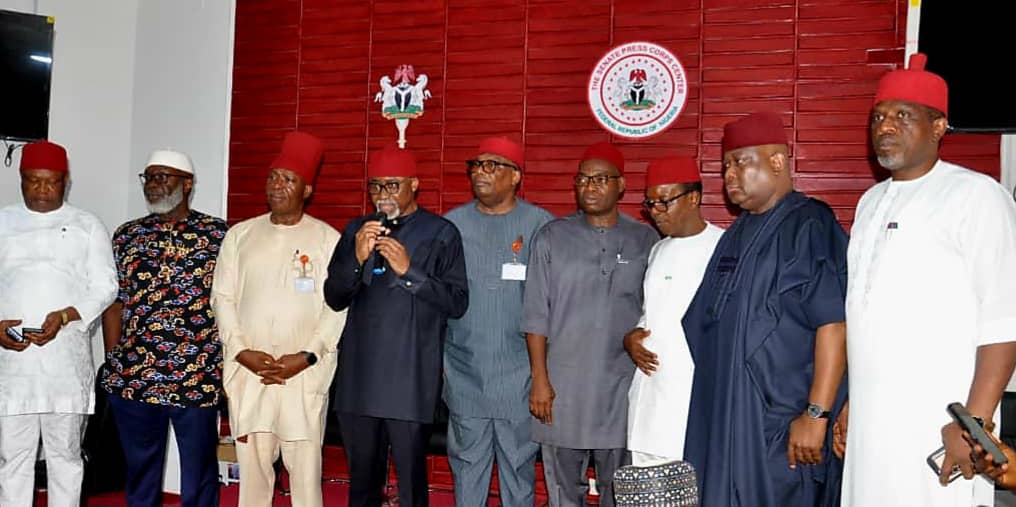The Senate on Thursday turned blind mind to a motion seeking to immortalize the late former National Electoral Commission (NEC) chairman, Professor Humphrey Nwosu, who midwifed the successful June 12, 1993 presidential poll that was annulled by former military Head of State, Ibrahim Badamosi Babangida.
This is coming on the heels of the South East caucus insistence that their prayers for the immortalization of Professor Humphrey Nwosu can only be delayed but cannot be denied.
Addressing the Senate Press Corps after the motion was thrown out, the caucus, led by Senator Eyinaya Abaribe said Humphrey Nwosu was the one who laid the foundation of the democracy the country is enjoying now.
“The reason is simple. It may be delayed, but it will not be denied. Professor Humphrey Nwosu was the person who laid the foundations that we are all enjoying today.
“And so, as far as we are concerned, we think that even if this government does not honour Professor Humphrey Nwosu, a government in future will honour him. After all, some other governments refused to recognise Abiola, but later a government recognised Abiola.  “Some other governments didn’t recognise June 12, but later a government recognised June 12 as our democracy day. So we believe that in the future, a government of this country will make sure that they recognise those who have actually sacrificed and used their everything to make Nigeria a better place,” he said.
“Some other governments didn’t recognise June 12, but later a government recognised June 12 as our democracy day. So we believe that in the future, a government of this country will make sure that they recognise those who have actually sacrificed and used their everything to make Nigeria a better place,” he said.
The motion sponsored by Senator Eyinaya Abaribe is seeking the rename of the Independent National Electoral Commission INEC headquarters in Abuja after Profgesssort Nwosu and a posthumous national honour for him.
However, Senators in plenary led by Senator Adams Oshiomole faulted the motion saying the late NEC boss’s failure to announce the result demonstrate his lack of courage.
“Nigerians are really in pains because nobody is able to quote where Professor Nwosu announced the results. It is his failure to announce the result, whether under threat or under whatever forces that prevented him from so doing that Nigerians were unable to say that he (MKO) was declared the winner.
“In fact, I was active in that struggle. When we met with the late General Sani Abacha, he said the reason he decided to order the detention of MKO Abiola was that MKO Abiola proclaimed himself as the winner of the election and therefore as president. It was on that basis Abiola was arrested and he died in detention.
“If Professor Nwosu had had the courage I emphasize courage, as it’s been suggested here to announce the winner and damn the consequences. After all, he who is not ready to die for something, will end up dying for nothing.
“Professor Nwosu, when it mattered most, his courage failed him. And when you give national honors, and recognition, you do so for people who have shown courage, who have paid the supreme price, or who were ready to pay that price. cognizance of the fact that Professor Nwosu laid a landmark foundation. This is the reason it is even more painful to Nigerians,” he said.
Senator Osita Ngwu defended Nwosu, stating that he operated under military constraints and had no choice but to halt the announcement of election results. “There was no way he would have announced the results with a gun to his head. That doesn’t change the fact that some of us see him as a hero,” he argued.
However, Senator Cyril Fasuyi argued that history rewards results, not efforts. “As long as he did not announce the result, whether under duress or not, I am against naming INEC headquarters after him,” he submitted.
Senator Victor Umeh who seconded the motion said Professor Humphrey Nwosu was not just an ordinary figure in Nigeria.
“As the motion highlights, he served as the chairman of the National Electoral Commission for five years under the military regime of President Ibrahim Babangida.
“He played a vital role in Nigeria’s transition to democracy by establishing democratic structures and overseeing various elections.
“Under his leadership, elections for the House of Assembly, governorship, and National Assembly were conducted using the Option A4 system, which required voters to physically line up behind their preferred candidates. These elections were widely praised, with minimal litigation over results.
“However, the most defining moment of his tenure was the June 12, 1993, presidential election. He prepared extensively for this historic election, which was meant to conclude his service to the nation.
However, on June 11, he was summoned by the military government and ordered to halt the election. Despite pressure, he refused, citing the law that prohibited courts from stopping scheduled elections,” he said.
He said while June 12 became a symbol of democracy, it is important to acknowledge that Professor Nwosu did not formally announce the election result.
“Some argue that his failure to do so, whether due to threats or other pressures, left room for uncertainty. Others believe he demonstrated great courage by refusing to stop the election despite military orders.
“Democracy is complex, and the legacies of its key figures must be evaluated carefully. Some believe that Professor Nwosu deserves to be honored for his role in conducting the election. Others argue that true courage would have meant announcing the result despite the risks.
“Ultimately, whether we support or oppose his recognition, we must remember that Professor Nwosu will be laid to rest tomorrow. In honoring the dead, we should be mindful of their contributions and the circumstances they faced.”


